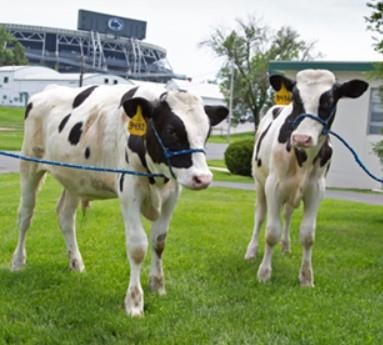In celebration of Women’s History Month, USDA’s National Institute of Food and Agriculture (NIFA) is highlighting leading women helping advance agriculture-related sciences.
The following is an interview with NIFA-funded researcher Dr. Jacqueline Nolting. Dr. Nolting, who works as a research scientist in the Animal Influenza Ecology and Epidemiology Research Program at The Ohio State University.

Tell us your journey and how your interest in agriculture developed.
I grew up on a small hobby farm in central Ohio with horses, sheep, cattle, chickens and rabbits. I was extremely involved in 4-H beginning in third grade. At a young age, I developed an interest in veterinary medicine and took every opportunity possible to learn more about the profession. Those experiences led me to FFA as a high school student, which really fostered my passion for agricultural education. As a state FFA officer, I was introduced to leading students in a classroom setting and made connections with individuals who inspired my path. My interests in veterinary medicine didn’t diminish, and I began working as a student research assistant in the Department of Preventive Veterinary Medicine during my undergraduate degree program in animal sciences. During that time, I was introduced to the pursuit of discovery and made the decision to continue a path of research rather than practicing veterinary medicine.
Much of the work we do studying zoonotic disease at the animal-human interface has real-life implications on the agricultural community and there is a need for disseminating that knowledge to producers. While starting to develop a youth in agriculture education program geared toward educating youth swine exhibitors on the risk and prevention of zoonotic disease (ie. Influenza), I pursued a Ph.D. in Agriculture and Extension Education. Now, I have a career that encompasses both my passions for veterinary medicine and agriculture education.
What is your relationship with the National Institute of Food and Agriculture?
I currently have two projects funded by NIFA. One is funded by the Veterinary Services Grant Program titled “Moving from Meows to Moos; Recruiting Teens to Food Animal Veterinary Medicine Through Education, Experience and Engagement,” which is aimed at building awareness of careers in food animal medicine to high school students. The second titled "Repairing Ohio's 'Leaky Pipeline' Through Awareness and Engagement in Science, Technology, Engineering and Mathematics (STEM) Careers" is funded by the Women and Minorities in Science, Technology, Engineering and Mathematics Fields Grant Program (WAMS) Fields Grant Program. The objective of this project is to build awareness of middle school girls and minorities of the opportunities in STEM agriculture careers.
Who are your role models? Who/what inspires you?
One of the most influential individuals on my path was my high school agriculture educator, Stephanie Jolliff. She led me to opportunities I would have never discovered on my own and encountered every situation with knowledge and grace. I am so fortune to now be working with her on the WAMS project, as we develop curriculum for youth girls/minorities to lead them to STEM careers.
I was also highly influenced by the founder of the Animal Influenza Ecology and Epidemiology Research Program, Dr. Richard Slemons. He is an icon in avian influenza research, and I learned more from him on the topic than what could be obtained from any textbook. Dr. Slemons also has a real passion for guiding students, which is a characteristic I aspire to emulate.
What personal challenges have you encountered and how did you overcome them?
I pursued both my masters and doctoral degrees while working full time in the laboratory. While it was extremely challenging, I was able to keep up thanks to the amazing support of my family and colleagues.
What advice would you give to girls and young women who want to enter agriculture?
Don’t give up! Even when there are unexpected twists and turns on your path, keep forging ahead. Don’t be afraid to create your own non-traditional path. A virologist who makes slime with kids at pig shows doesn’t fit the norm, but I am making it work— pursuing a career I love!
Source : usda.gov